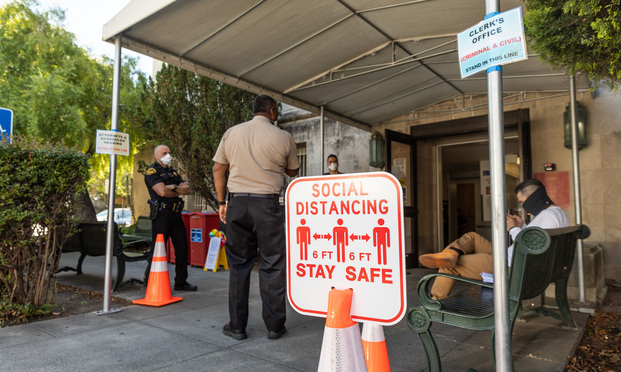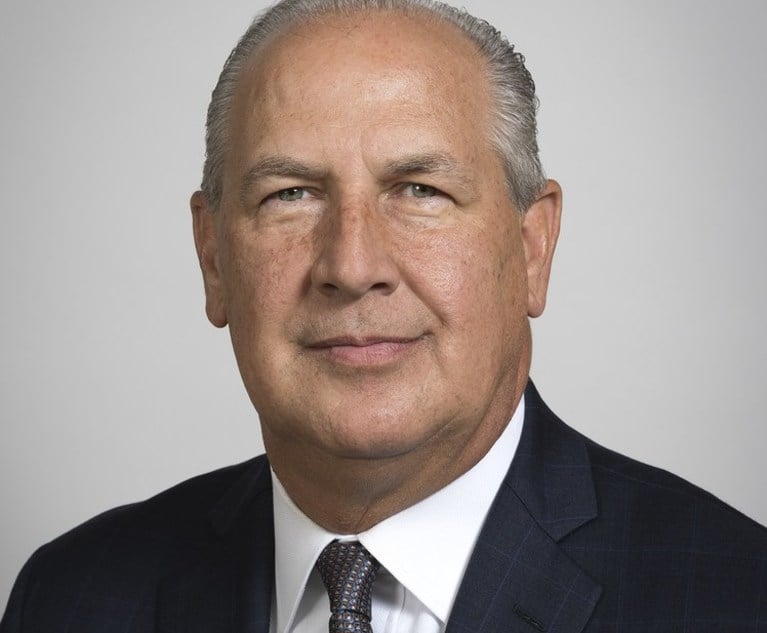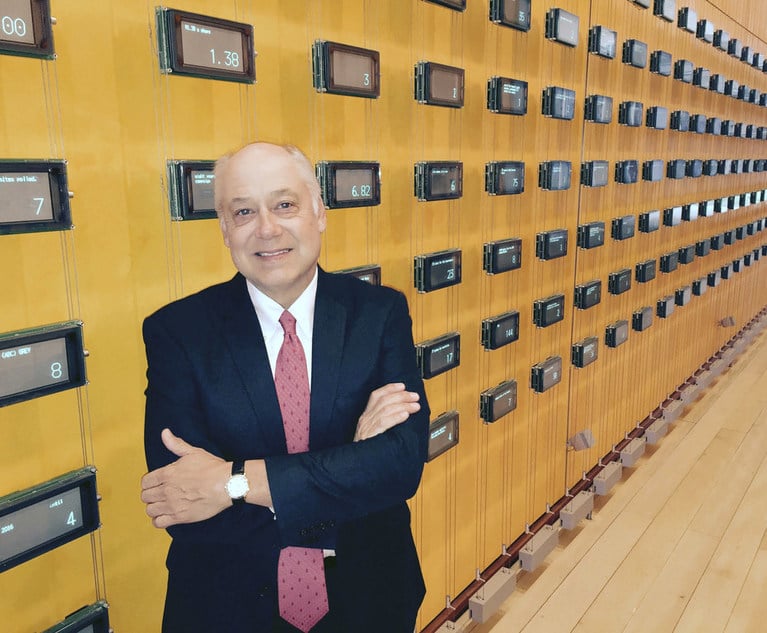Masks, Sanitizer and Measuring Tape: What Jury Trials May Look Like Post-COVID
Constitutional mandates must be balanced with juror safety, which all court leaders identified as the top priority.
May 27, 2020 at 01:49 PM
8 minute read
 The county seat courthouse in Contra Costa County, California, opened up May 26 with mask requirements and temperature checks for all entrants. (Photo: Jason Doiy/ALM)
The county seat courthouse in Contra Costa County, California, opened up May 26 with mask requirements and temperature checks for all entrants. (Photo: Jason Doiy/ALM)
Editor's note: This is the second in a two-part series examining when jury trials might begin to take place in Pennsylvania, and what they may look like once they do.
Pennsylvania court leaders are juggling a multitude of questions as they try to restore jury trials, from how prospective jurors are brought into court buildings to figuring out where they can deliberate safely.
One thing can be stated with certainty, however: jury trials are going to look very different in the wake of the COVID-19 pandemic.
Courthouses have been largely closed since mid-March as part of a nationwide effort to help stem the spread of the highly contagious coronavirus. In recent weeks, however, courts have begun to expand their capabilities, and many court leaders in the state have begun the process of determining what it will take to get juries back into courtrooms.
Consensus, however, has grown around the idea that jury trials in southeastern Pennsylvania are at best several months away, and, for civil trials, likely not to occur until at least 2021.
Attorneys also widely agree that, once trials are underway, they are going to be very different.
"The jury trial we imagine in our heads is not going to return until there is a vaccine, until people have some sense of comfort," Sozi Tulante of Dechert said.
'Antithetical to Social Distancing'?
Under normal circumstances, the stakes at trial are very high—defendants are fighting for their freedom and to vindicate their names, and plaintiffs are seeking remedies for loss and their day in court. However, the stakes are even higher when the health and safety of all involved—including attorneys, judges, court staff and jurors—are at risk.
But during pandemic conditions, even when they become manageable, jurors would face elevated health risks, since they are often grouped together and spend hours in close quarters deliberating over cases. Constitutional mandates must be balanced with juror safety, which all court leaders identified as the top priority.
"Jury duty is a responsibility and we owe the responsibility to the jurors to ensure they're going to be safe," Philadelphia Court of Common Pleas President Judge Idee Fox said.
The key questions the judges are now tackling are: how many jurors can be brought in, where will they sit and where can they deliberate.
The answers will be different for each jurisdiction and often hinge on the architecture of the courthouses. In some venues, activity is concentrated on the first floor, but, for example, many of Pennsylvania's federal courthouses are high-rise buildings, with many courtrooms on upper floors. In those buildings jurors need elevator access to get around. Philadelphia state courts are in similar high-rises. At the Stout Center for Criminal Justice the morning crush of people in the elevator bay is infamous in the city's legal community.
"The building itself is about as antithetical to social distancing as you can design," Greenblatt, Pierce, Funt & Flores attorney James Funt said.
And regardless of access, most jury rooms are cramped and could not fit the number of people needed for trial if social distancing guidelines are followed.
To cope, many systems, including Philadelphia, are considering ways to move the proceedings outside the courthouses, with nearby school gymnasiums or hotel ballrooms as possibilities. Some changes will likely be universal regardless of the courthouse. Increased use of hand sanitizer, masks for jurors, increased signage, taking temperatures, and marking up the courtrooms to help increase awareness of social distancing are all obvious changes likely to take in every courthouse.
"Even though we're not going to have trials until September, my tip staff is already out with measuring tape, figuring out where the six-foot distance would be for various people," Lackawanna County Court of Common Pleas Judge Terrence R. Nealon said.
Jury summonses and questionnaires might also be modified so jurors can quickly be excused if they're at high risk or they are front-line essential workers. Court leaders are also considering using the public galleries or empty courtrooms for jury deliberations, or holding jury selection virtually.
Some jurisdictions are also exploring the possibility of reducing the number of jurors for civil trials from 12 to six, or reducing peremptory challenges.
According to U.S. District Judge Jeffrey Schmehl, the Eastern District is also considering adding TV screens in the courtroom, putting wireless microphones on attorneys, and potentially giving jurors access to iPads to view evidence.
There are a lot of external factors courts must consider as well, such as the availability and safety of public transportation, or child care needs if the schools continue to be closed. Another hurdle will be asking people to take more time off work just as people, who may have been furloughed or laid off, may just be beginning to get back to work.
And, in order to make any of these potential changes effective, the courts will need to broadly communicate with the public about exactly what has been done to ensure they're safety.
"If people do not feel safe, they're not going to come in, and we're not going to get a sample of the Eastern District," Schmehl said.
First Wave of Trials
Some venues, like Philadelphia, often have multiple trials happening at once, and as one is wrapping up, juries are being selected for others. That pace, however, will be all but impossible to maintain while social distancing requirements are in place. But, once juries are able to get back into the courtrooms, the first wave of cases are likely to be criminal trials, those who spoke with The Legal agreed, with courts prioritizing defendants who are currently incarcerated. That is a function of defendants' speedy trial right, and the fact that some have been incarcerated, awaiting trial months longer than they would have been if not for the pandemic.
"I understand it as a citizen of the world, but I'm incredibly torn and pained for the individuals who need access to the halls of justice," Funt said.
Trials are going to look much different, sources said. For instance, questions linger about whether defense attorneys will want to try cases if they and their clients will have to wear masks. And deciding not to wear a mask could also turn off jurors who are concerned about their health.
"It's a whole nuanced art form, jury trials. … Trials are very front and center, very in your face," Funt said. "If everybody's wearing a mask it's literally impossible to make those judgment calls they've made on a daily basis."
Some judges, observers said, might also look to streamline trial proceedings.
"They're not going to sit back and allow parties to go on and on. There could be limits on openings and closings," Tulante said. "I think you'll start to see trials happening more efficiently."
Schmehl said opinions differ, but his thinking is that the courts might want to start with the shortest trials first, sort of a series of bellwether trials to assess the difficult points. If a court kicks off a big, multi-defendant trial and that were to be tripped up in its final days, that could result in weeks of lost trial time, he said.
"Once everybody's used to how we're doing it, then you try the more complex trials," Schmehl said. "The best way to do it is to not just crash into it."
Similar to the need to notify jurors about the steps courts are taking, observers said courts also need to allow input from the various stakeholders, including the bar, to help ensure buy-in.
The first post-COVID case set to go to trial in Ohio was plagued with objections and appeals to that state's Supreme Court, with the defense bar contending that many of the changes the court put in place were unconstitutional. Buy-in from the bar could help prevent a similar situation.
"If it's ad hoc and done without that [buy-in], you would have a lot of motion practice, a lot of resistance that would get in the way of it actually being done," Tulante said. "Whatever the process, you have to let the public know, so they're not imagining you're going to be in a room with 200 other people, that your safety will be kept in mind."
This content has been archived. It is available through our partners, LexisNexis® and Bloomberg Law.
To view this content, please continue to their sites.
Not a Lexis Subscriber?
Subscribe Now
Not a Bloomberg Law Subscriber?
Subscribe Now
NOT FOR REPRINT
© 2025 ALM Global, LLC, All Rights Reserved. Request academic re-use from www.copyright.com. All other uses, submit a request to [email protected]. For more information visit Asset & Logo Licensing.
You Might Like
View All
Kirkland Lands in Phila., but Rate Pressure May Limit the High-Flying Firm's Growth Prospects
5 minute read
Montgomery McCracken Touts 'Record' Financial Performance Despite Shrinking Head Count
6 minute read
Class Action Settlements Totaled $40B+ Three Years in a Row: 'We’re in a New Era'
5 minute readLaw Firms Mentioned
Trending Stories
Who Got The Work
J. Brugh Lower of Gibbons has entered an appearance for industrial equipment supplier Devco Corporation in a pending trademark infringement lawsuit. The suit, accusing the defendant of selling knock-off Graco products, was filed Dec. 18 in New Jersey District Court by Rivkin Radler on behalf of Graco Inc. and Graco Minnesota. The case, assigned to U.S. District Judge Zahid N. Quraishi, is 3:24-cv-11294, Graco Inc. et al v. Devco Corporation.
Who Got The Work
Rebecca Maller-Stein and Kent A. Yalowitz of Arnold & Porter Kaye Scholer have entered their appearances for Hanaco Venture Capital and its executives, Lior Prosor and David Frankel, in a pending securities lawsuit. The action, filed on Dec. 24 in New York Southern District Court by Zell, Aron & Co. on behalf of Goldeneye Advisors, accuses the defendants of negligently and fraudulently managing the plaintiff's $1 million investment. The case, assigned to U.S. District Judge Vernon S. Broderick, is 1:24-cv-09918, Goldeneye Advisors, LLC v. Hanaco Venture Capital, Ltd. et al.
Who Got The Work
Attorneys from A&O Shearman has stepped in as defense counsel for Toronto-Dominion Bank and other defendants in a pending securities class action. The suit, filed Dec. 11 in New York Southern District Court by Bleichmar Fonti & Auld, accuses the defendants of concealing the bank's 'pervasive' deficiencies in regards to its compliance with the Bank Secrecy Act and the quality of its anti-money laundering controls. The case, assigned to U.S. District Judge Arun Subramanian, is 1:24-cv-09445, Gonzalez v. The Toronto-Dominion Bank et al.
Who Got The Work
Crown Castle International, a Pennsylvania company providing shared communications infrastructure, has turned to Luke D. Wolf of Gordon Rees Scully Mansukhani to fend off a pending breach-of-contract lawsuit. The court action, filed Nov. 25 in Michigan Eastern District Court by Hooper Hathaway PC on behalf of The Town Residences LLC, accuses Crown Castle of failing to transfer approximately $30,000 in utility payments from T-Mobile in breach of a roof-top lease and assignment agreement. The case, assigned to U.S. District Judge Susan K. Declercq, is 2:24-cv-13131, The Town Residences LLC v. T-Mobile US, Inc. et al.
Who Got The Work
Wilfred P. Coronato and Daniel M. Schwartz of McCarter & English have stepped in as defense counsel to Electrolux Home Products Inc. in a pending product liability lawsuit. The court action, filed Nov. 26 in New York Eastern District Court by Poulos Lopiccolo PC and Nagel Rice LLP on behalf of David Stern, alleges that the defendant's refrigerators’ drawers and shelving repeatedly break and fall apart within months after purchase. The case, assigned to U.S. District Judge Joan M. Azrack, is 2:24-cv-08204, Stern v. Electrolux Home Products, Inc.
Featured Firms
Law Offices of Gary Martin Hays & Associates, P.C.
(470) 294-1674
Law Offices of Mark E. Salomone
(857) 444-6468
Smith & Hassler
(713) 739-1250






